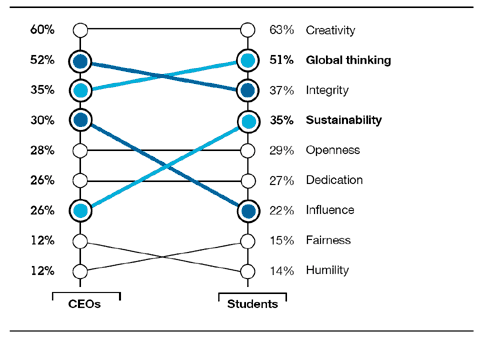My friend and colleague at the Medinge Group, Ava Hakim, passed on a few papers from her day job at IBM. The first is the latest edition of a biennial global CEO survey, while the second asks the next generation of leaders—Generation Y. The aim: to find out what these groups think about the challenges and goals for CEOs.
Unsurprisingly, both studies (involving thousands of respondents) had commonalities, though Generation Y placed global awareness and sustainability more highly on their list.
Creativity, however, is ranked as the most valuable leadership trait. What society doesn’t need, they tell us, is the same-again thinking if we are to make progress in the 2010s. The old top values of ‘operational excellence’ or ‘engineering big deals’ no longer come up top in this new decade.
Or, as I heard from one gentleman yesterday, we can’t afford to have the sort of ‘experience’ certain people tout, for they do not have 25 years’ experience—they just have one year’s experience, over and over again, 25 times.
You know I’m going to say it, so I might as well: this sounds like the sort of ‘experience’ some of my political opponents have had, day in, day out. Groundhog Day comes to mind.
Indeed, the studies indicate that we have a far more complex world, and same-again thinking isn’t going to cut it.
In the first study (emphasis in original):
Creativity is the most important leadership quality, according to CEOs. Standouts practice and encourage experimentation and innovation throughout their organizations. Creative leaders expect to make deeper business model changes to realize their strategies. To succeed, they take more calculated risks, find new ideas, and keep innovating in how they lead and communicate.
The most successful organizations co-create products and services with customers, and integrate customers into core processes. They are adopting new channels to engage and stay in tune with customers. By drawing more insight from the available data, successful CEOs make customer intimacy their number-one priority.
Later:
Facing a world becoming dramatically more complex, it is interesting that CEOs selected creativity as the most important leadership attribute. Creative leaders invite disruptive innovation, encourage others to drop outdated approaches and take balanced risks. They are open-minded and inventive in expanding their management and communication styles, particularly to engage with a new generation of employees, partners and customers.
And:
Creative leaders consider previously unheard-of ways to drastically change the enterprise for the better, setting the stage for innovation that helps them engage more effectively with today’s customers, partners and employees.
The study also highlights an increase in globalization, especially in developing markets, leading to greater complexity. It also says the most successful leaders are prepared to change the business models under which they operate.
In fact, the world we now live in demands that our leaders are globally aware, and see the need to compete in a global market-place.
The implications for this city are that Wellington can no longer afford to see itself as merely the capital of New Zealand or the geographic centre. It is one of many cities that must compete for attention and resources at a global level—which means creating world-class centres of excellence for our industries. Creating such clusters can even help them stay domestically owned.
The study indicates that the style of leadership is going to be, necessarily, internationalist—which means we can’t afford to have leaders who are monocultural, and fake multiculturalism. This, like any aspect of a brand, must be embodied for real. It doesn’t mean giving up what ‘being a New Zealander’ is; it does, however, mean that we have to be able to communicate with other nations and cultures, seeking advantages for ourselves.
Innovation is a driver both in terms of internal processes and as a core competence—so leaders had better be prepared to do this. And being closer and more transparent with customers—or in the case of a city, citizens—is something practised by the most successful leaders, says the study. It reminds me of the topics in the first book I contributed to, Beyond Branding—where integrity and transparency were at the core.
When it comes to the Generation Y study, the results were similar. This table summarizes the two quite well, and notes how the two groups differ:

I don’t want to be giving the impression that the second study is less important, but realize that some of you are sorely tempted to see me wrap up this post.
I will say, quickly, that the lessons are clear: the next generation expects leaders to be globally minded and sustainable.
Chinese respondents in the second study, in fact, valued global thinking ahead of creativity. This perhaps highlights where the People’s Republic, above the other Chinese territories, is heading: looking outwardly first and delivering what customers in export markets want.
As creativity is naturally a trait among Wellington businesses, it’s nice to know that many are already prepared for the challenges of the 2010s. And some of our most successful names would not have got to where they are without global thinking, even if some have been acquired by overseas companies: 42 Below, Weta, and Silverstripe come to mind.
However, I can’t see these traits being reflected in politics—and that’s something I hope we can change in the local body elections, for starters.







Excellent post! Creative minds are great thinkers. And great thinkers make great leaders.